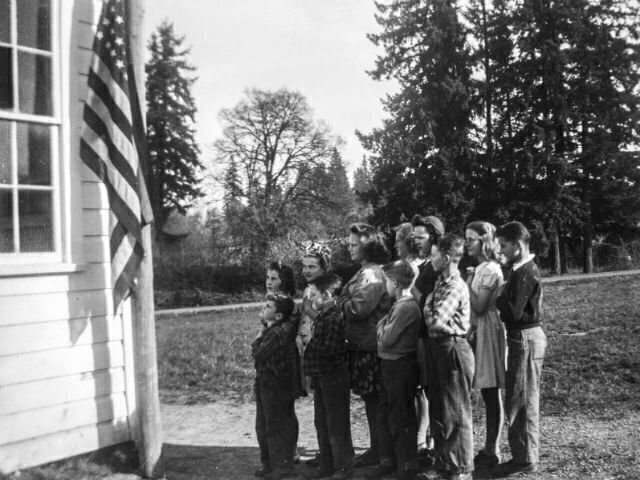 Children and young people are often the ones brave enough to challenge the constitutional status quo. In Supreme Court cases like Tinker v. Des Moines Independent School District and Hazelwood School District v. Kuhlmeier, students’ fearlessness pushed the issue of free speech in public schools into the national spotlight. So it was that on June 14, 1943, another such child won a landmark victory for student speech.
Children and young people are often the ones brave enough to challenge the constitutional status quo. In Supreme Court cases like Tinker v. Des Moines Independent School District and Hazelwood School District v. Kuhlmeier, students’ fearlessness pushed the issue of free speech in public schools into the national spotlight. So it was that on June 14, 1943, another such child won a landmark victory for student speech.
The case, West Virginia State Board of Education v. Barnette, was decided in the shadow of a dispute from three years earlier. Both cases involved members of the Jehovah’s Witnesses, a religion that calls them to not pledge to any symbol or object. The sect’s U.S. leader, Joseph Rutherford, required that followers renounce the Pledge of Allegiance to the U.S. flag, which sources say came from the contemporaneous annihilation of dissident Jehovah’s Witnesses in Nazi Germany for similar offenses against the Nazi flag.
In the earlier 1940 case of Minersville School District v. Gobitis, children Lillian and William Gobitas (the Court spelled their name incorrectly) were expelled from a Pennsylvania public school for not participating in the Pledge. When brought to the court, Justice Felix Frankfurter wrote the majority opinion. He concluded that freedom of religion and speech, along with the right to due process, do not apply to the promotion of “political responsibilities.” Specifically, he wrote, “The mere possession of religious convictions which contradict the relevant concerns of a political society does not relieve the citizen from the discharge of political responsibilities.”
Frankfurter went on:
[T]he question remains whether school children, like the Gobitis children, must be excused from conduct required of all the other children in the promotion of national cohesion. We are dealing with an interest inferior to none in the hierarchy of legal values. National unity is the basis of national security. To deny the legislature the right to select appropriate means for its attainment presents a totally different order of problem from that of the propriety of subordinating the possible ugliness of littered streets to the free expression of opinion through distribution of handbills.
After the 8-1 Minersville decision, in which Justice Harlan Fiske Stone was the sole dissenter, states had the authority to force children to participate in the Pledge. The Court maintained for only three years that “national cohesion” was of higher interest than one’s personal beliefs.
In West Virginia v. Barnette, the Court's Minersville decision was overruled. Justice Robert Jackson wrote the 6-3 majority opinion, with Frankfurter now in dissent.
Jackson emphasizes that free expression overrides the goal of national unity. A compulsory flag pledge goes against the fundamental values of the First Amendment, which protects freedom of expression and thought from government intrusion in all but the most extreme cases. He concludes his opinion with a stirring reflection on the dangers of forced “unity” and the importance of individual liberty:
The case is made difficult not because the principles of its decision are obscure, but because the flag involved is our own. Nevertheless, we apply the limitations of the Constitution with no fear that freedom to be intellectually and spiritually diverse or even contrary will disintegrate the social organization. … [F]reedom to differ is not limited to things that do not matter much. That would be a mere shadow of freedom. The test of its substance is the right to differ as to things that touch the heart of the existing order.
If there is any fixed star in our constitutional constellation, it is that no official, high or petty, can prescribe what shall be orthodox in politics, nationalism, religion, or other matters of opinion, or force citizens to confess by word or act their faith therein. If there are any circumstances which permit an exception, they do not now occur to us.
Joined by Justices Owen Roberts and Stanley Reed in dissent, but writing alone, Frankfurter holds fast to a strong notion of judicial restraint:
As a member of this Court, I am not justified in writing my private notions of policy into the Constitution, no matter how deeply I may cherish them or how mischievous I may deem their disregard. … In the light of all the circumstances, including the history of this question in this Court, it would require more daring than I possess to deny that reasonable legislators could have taken the action which is before us for review.
NFL player Colin Kaepernick brought these two perspectives into think-piece spotlight in 2016, when he kneeled during a performance of the National Anthem. Surely, many Americans watching that situation were sympathetic to Frankfurter, believing that “the promotion of good citizenship” is a legitimate goal that should not be undermined. Yet others may have channeled Jackson in arguing that Americans should be free to refuse any kind of pledge to people or things that they may not fully agree with.
Seventy-four years after West Virginia v. Barnette, patriotism and free speech still collide now and then. Such debates remind us that individual expression can be criticized and yet still protected by the First Amendment.
Symone Mazzotta is an intern at the National Constitution Center. She is also a recent graduate of Fairfield University.







